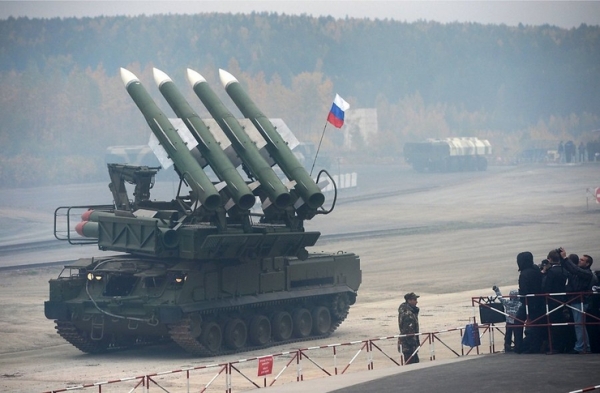
Russia will protect the rights of its citizens and Russian-speakers everywhere, even in other countries. Already for some time claimed by the Kremlin. In this case, would make ethnic Russians of Lithuania, “to protect the rights” which would go to tanks and “green men”?
Two years ago in the seriousness of such warnings could see Ukraine, which is defending the interests of Russian-speaking, he tore off a piece of Crimea and the surrounding area in the South-East. Of the Russian-speaking rejoiced and openly supported the occupiers. The Baltic States are concerned. Not only due to the fact that Russia can repeat that in Lithuania, Latvia or Estonia. Began to think about how in this case will behave in the local Russian-speaking?
Doubt, based on just nationality may offend minorities. However, it is no secret that Vladimir Putinopoly the local population for their own purposes.
“Russia to carry out their task in Lithuania help and localnames the leaders of the Russian-speaking, who call themselves compatriots”, — was said in report of the Department of state security (DGB).
Russia is funding two such organizations in Lithuania — the Centre of protection and research of fundamental rights and an Independent centre for human rights. However, the real sentiments of the people of Lithuania can be determined only through research. By order of the Eastern Europe studies Centre company Baltijos tyrimai/ Gallup poll of 500 poles, Russians and representatives of other nationalities at the age of 18-74 years.
A survey conducted in Vilnius, Vilnius district, Visaginas, šalčininkai and Klaipeda, where most of the representatives of national minorities. The survey conducted from 27 June to 12 July 2016. According to the Deputy Director of Baltijos tyrimai of Romas machyunasa of such criteria is the most objective method to study the views of minorities, as in the above-mentioned halls is home to about 90% of non-Lithuanians.
The majority of respondents (55%) were women, most of all among the respondents were people aged 50-74 years. 46% of survey participants — poles, 35% Russians, 8% — Belarusians, 6% Ukrainians, 2% Jews and 3% other nationalities. The majority of respondents (83%) were born in Lithuania. Among the many questions and allegations were related to the issue of loyalty.
For example, 64.8 per cent answered positively to the question they would defend Lithuania, if she was attacked. Despite the neutrality of the statements, can be identified and the personal opinion of respondents. According to Maciunas, big surprises of the survey are presented. He believes that the protection of Lithuanian persons of other nationality think the same way as all residents of Lithuania. A higher percentage of positive answer to this question was for those who know the Lithuanian language — read, write, speak Lithuanian (74,6%), those who studied in Lithuanian schools (81.1 per cent), those who married the Lithuanian/Lithuanian, or people with higher education (80.5 per cent).
In 2014 Lithuania was a study of European values, which showed that the country in case of threats ready to defend 57% of the population, in 2005 there were only 32%. But still in Lithuania did not try to specify only the minorities question about the readiness to defend their country. In June and July, a study was conducted in which with the statement that Lithuanian citizens would defend their country in case of aggression more agreed Russian — 65%, in the number of poles was less for 59.9%.
“In defence Russians have always been more active in the protection, particularly those of younger age who identify themselves with that state. Look at the list of recruits — they go and serve,” said Maciunas.
By the way, 62.5 percent agreed with the need to protect Lithuania did not want to call your level of proficiency in Lithuanian. Only 42.8% of survey participants agree with the statement that the security of Lithuania are important for EU membership and NATO, to 22.2% disagreed.
Meanwhile, the assertion that the part of the representatives of national minorities disloyal to Lithuania, appreciated so less than a third agreed and 33.4% said neither Yes nor no, to 31.2% did not agree. Interesting results were shown and the questions about international politics. For example, more than half — 52.8 per cent — of the participants of the survey agree with the imposed by the Russian propaganda claim that the Russian policy — an appropriate response to her against the actions of the US and NATO.
In addition, the occupation of Crimea legal action I think is 42.8% of survey participants. Most of all, this statement was supported by the graduates of Russian schools or 48.3%, graduates of Polish schools, 39.5% and the people poor knowledge of Lithuanian (65.6 per cent). Finally, 40.8% of survey respondents essentially agreed with abandoned once Putin saying that the collapse of the USSR is the greatest geopolitical catastrophe.
Interestingly, this tended to accept graduates of Polish schools (43.4 percent), graduates of Russian schools with this view was a little less (or 41.2%). However, according to the Director of the center, which ordered the study, Linas Coaly, we should not dramatize the survey data. “A definite trend is visible — the better integrated group of companies (for example, fluent in Lithuanian) is optimistic about such issues as the protection of Lithuanian citizens in the face of danger.
The percentage of those who do not speak Lithuanian or bad knows, a lot less, but it should be noted that some of those who completely deny this issue,” his confidence Koala. In his opinion, there is a need for projects that encourage dialogue and strengthen citizenship as a phenomenon. In addition, according to the analyst, especially interesting is the aspect that a third of the poles and the Russian quarter agree with the statement that some minorities can be disloyal to Lithuania.
“On the one hand, it shows that true dissatisfaction with the state of certain segments of society; on the other, there are very a lot conscious representatives of national minorities who think about this phenomenon. So careless and absolute fear of all the representatives of national minorities and the premise that they pose a security threat is unfounded,” said Koala.
“Why Russians don’t want Russian in the presidency?” – Delfi








